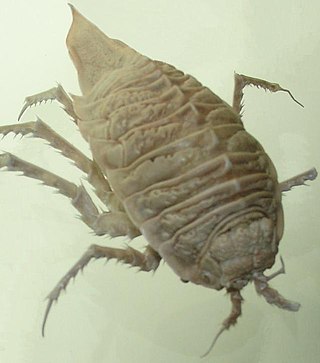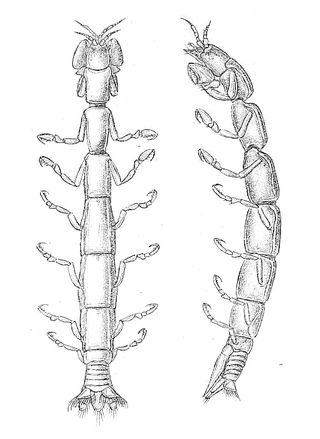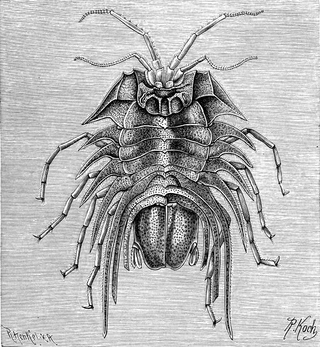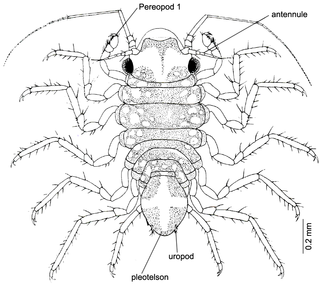
Saduria entomon is a benthic isopod crustacean of the family Chaetiliidae. It is distributed along the coasts of the Arctic Ocean and of the northern Pacific Ocean. It is also found in the brackish Baltic Sea, where it is considered a glacial relict. Moreover, it is present in a number of North European lakes, including Ladoga, Vänern and Vättern. It has been introduced into the Black Sea.

The Valvifera are marine isopod crustaceans. Valviferans are distinguished, however, by the flat, valve-like uropods which hinge laterally and fold inward beneath the rear part of their bodies, covering the pleopods. Some species are omnivorous, and serve as effective scavengers in the economy of the sea.

Sphaeromatidae is a family of isopods, often encountered on rocky shores and in shelf waters in temperate zones. The family includes almost 100 genera and 619 known marine species. Within these genera, there are groups that share distinctive morphologies; further research may reclassify these genus-groups as separate families.
Curassanthura is a genus of isopod crustaceans in the family Leptanthuridae. It contains the following species:
Onchotelson is a genus of isopod crustaceans in the family Phreatoicidae, which is endemic to Tasmania. It contains two species, both of which are listed as vulnerable on the IUCN Red List:
Nichollsia is a genus of isopod crustaceans from India. It comprises two species:

Anthuroidea is a superfamily of isopod crustaceans, formerly treated as a suborder, Anthuridea. The group is characterised by "an elongate cylindrical body form, without dorsal coxal plates, and with a uropodal exopod attached to the peduncle proximally and dorsally". There are more than 500 described species in 57 genera, arranged across six families:

Pentidotea wosnesenskii is a marine isopod which lives on seaweed on rocky shores along the British Columbia and Washington coastlines, as far south as San Francisco. It can often be found hiding under rockweed in the intertidal zone, and can be found in depths up to 919 metres (3,015 ft). It was described as Idotea wosnesenskii in 1851, by Johann Friedrich von Brandt, and is named after the Russian biologist Ilya G. Voznesensky. The isopod grows up to 4 centimetres (1.6 in) in length and is usually green in colour.
Iais is a genus of isopod crustaceans. Iais species are found in association with larger isopods of the family Sphaeromatidae, usually on the ventral surface of the larger animal, between the pereiopods and on the pleopods. They are native to Australasia and South America, although Iais californica and its host Sphaeroma quoyanum have invaded California, and I. californica was first described from Sausalito, California.

The Idoteidae are a family of isopod crustaceans. It includes these genera:

The Leptanthuridae are a family of isopod crustaceans, containing the following genera:

Sphaeromatidea is a suborder of isopod crustaceans.
Chiridotea is a genus of isopod crustaceans in the family Chaetiliidae, containing the following species:

The Chaetiliidae are a family of isopod crustaceans in the suborder Valvifera, comprising these genera:

Saduria is a genus of benthic isopod crustaceans in the family Chaetiliidae, containing the following species:

Serolidae is a family of isopod crustaceans. The family encompasses 22 genera with 109 species. These species are exclusively marine and are distributed across the marine realms as follows: one species can be found in the Temperate Northern Atlantic, one species in the Temperate Northern Pacific, seven species in the Tropical Atlantic, six species in the Central Indo-Pacific, 16 species in Temperate South America, one species in Temperate Southern Africa, 20 species in Temperate Australasia, and 31 species in the Southern Ocean.

Dynoides elegans is a species of isopod crustacean in the genus Dynoides. It was originally described in 1923 by Pearl Lee Boone as "Cianella elegans" based on specimens from La Jolla and San Pedro, California. It was transferred to the genus Dynoides in 2000, when Boone's genus was sunk into synonymy with Dynoides.
Porcellionides cilicius is a woodlouse that can be found on Cyprus and in Turkey. The species have one subspecies Porcellionides cilicius antiochensis that can be found only on Cyprus.

The Munnidae are a family of isopod crustaceans, containing these genera:
Rectarcturidae is a family of marine isopods belonging to the suborder Valvifera.








